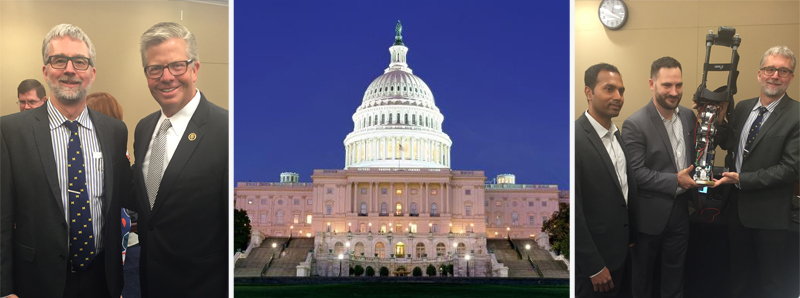Michigan shines at the National Robotics Initiative 5 year anniversary
The NRI is a multi-agency effort to accelerate the development and use of robots that work beside or cooperatively with people.

 Enlarge
Enlarge
Professor Jessy Grizzle took part in a full day of events celebrating the fifth anniversary of the National Robotics Initiative (NRI) on June 9, 2016. The NRI is a multi-agency effort to accelerate the development and use of robots that work beside or cooperatively with people. The series of events on the Hill highlighted some of the advances the NRI has stimulated and discussed the importance of U.S. leadership in robotics.
Dr. Grizzle began the day by meeting with some of the offices within the Michigan delegation. Afterwards, there was a lunch briefing and exhibition featuring some of the NRI grant recipients. On display at the exhibition was the collaborative effort between U-M, Georgia Tech and Carnegie Mellon. The team focuses on bipedal and wearable robots that can be used as lower limb prosthetics.
The U-M team was interviewed on PBS News Hour, which can be viewed here (starting ~ 1:45).
Reported in the U-M Federal Relations for Research newsletter by:
Madeline Nykaza, Federal Relations Associate
Kristina Ko, Senior Director of Federal Relations for Research
University of Michigan DC Office
More Info
The Congressional Robotics Caucus’ expo marking five years of the National Robotics Initiative in Washington, D.C. on June 9 (Congressional Robotics Caucus: Expo and Briefing)
IEEE reported on the event, including a brief interview with Dr. Grizzle. Read their story here.
What’s Needed Next
Reported as the expo: US funds Robotics Research at 1/5 of our global competitors, relative to GDP
“It was very exciting to meet fellow robotics researchers and to share our work with members of Congress,” said Prof. Grizzle, who appreciates all that the NRI has done for the field. However, he said that the actual robots are expensive, and the funding of the robots themselves, in addition to research and student support, is critical.
Prof. Jason Corso, who also has received funding from the initiative, said, “The NRI program has let my research group focus on problems at the boundary of perception and language with the freedom to explore innovative methods that have strong potential to revolutionize the way robots and humans work together in spatially oriented tasks.”
 MENU
MENU 
